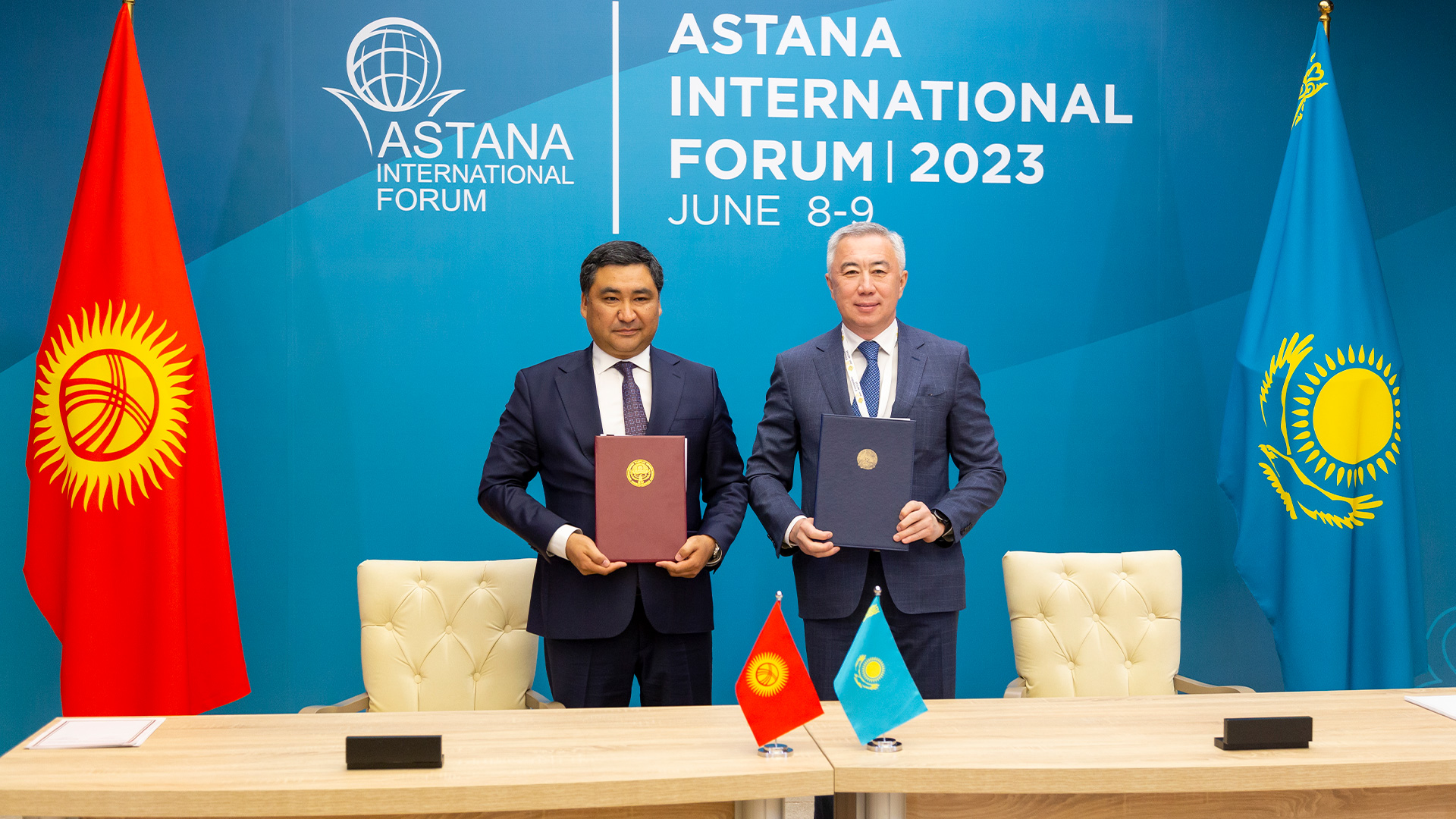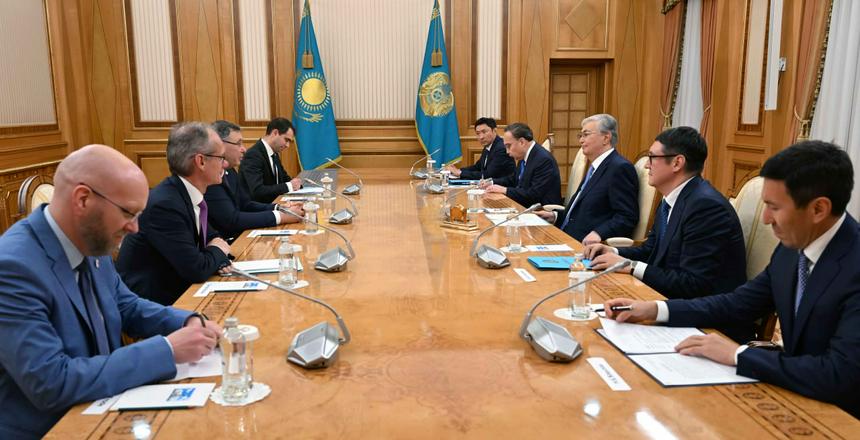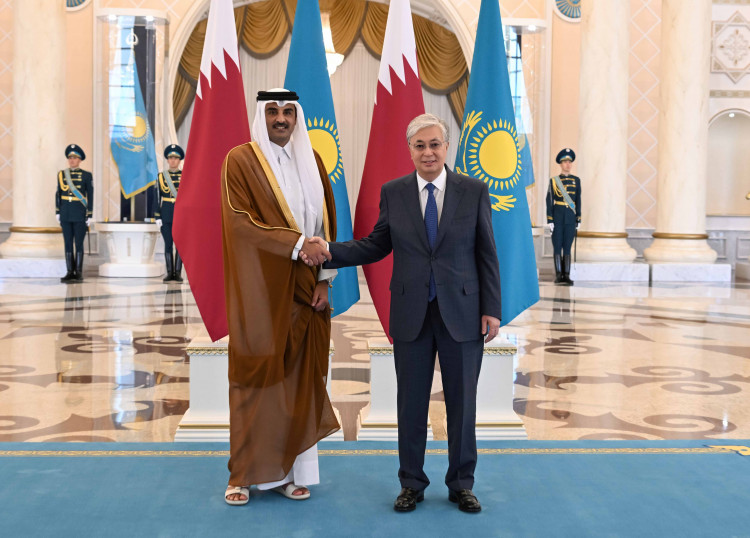ASTANA – Significant agreements and deals were signed during the Astana International Forum on June 8-9 to boost Kazakhstan’s investment and economic growth.

Minister of Trade and Integration of Kazakhstan Serik Zhumangarin(R) and Kyrgyz Minister of Economy and Commerce Daniyar Amangeldiev(L). Photo credit: primeminister.kz.
President Kassym-Jomart Tokayev met with Claudio Descalzi, CEO of Italian energy company Eni, to discuss the company’s activities and decarbonization initiatives in the country, reported the Akorda.
Following the meeting, Eni and KazMunayGas (KMG), the national operator of the oil and gas industry of Kazakhstan, announced plans to launch a joint 250-megawatt Hybrid Renewables-Gas Power Plant project in Zhanaozen in the Mangystau Region.
“The project, which is the first-of-its-kind in the country, comprises a solar power plant, a wind power plant and a gas power plant for the production and supply of low-carbon and stable electricity to KMG subsidiaries in the area,” reads the ENI’s release.

Tokayev meets with Total Energies CEO Patrick Pouyanné. Photo credit: akorda.kz.
Patrick Pouyanné, Chairman and CEO of French energy and petroleum company TotalEnergies, and Almasadam Satkaliyev, Kazakh Minister of Energy and Mineral Resources, signed an agreement to build a 1-gigawatt onshore wind farm and a 600-megawatt battery energy storage system in the Zhambyl Region. It is expected to be the largest renewable energy project generating 15% of electricity from renewable sources by 2030.
“The will, the human and economic resources are there, and the technology is advancing by leaps and bounds. All of this should encourage us collectively to go even further to support electrification and ramp up renewable energy. Of course, we can’t do it on our own: Political leaders and economic players need to create the right conditions that match ambitious goals. We also need policies that are built for the long run, if we want to meet climate expectations, support changes in usage – and offer our customers energy at the best price,” wrote Pouyanné on LinkedIn.
Additionally, Kazakhstan and the Kyrgyz Republic agreed to establish an industrial trade and logistics hub at the border checkpoints to speed up cargo delivery and reduce logistics costs.
“It is a further step in the development of our economic and good neighborly relations. It is a huge breakthrough for businesses in Kazakhstan and the Kyrgyz Republic,” said Kazakh Deputy Prime Minister – Minister of Trade and Integration Serik Zhumangarin.
Zhumangarin also met with Parviz Shahbazov, Minister of Energy of Azerbaijan, as Kazakhstan seeks to increase oil exports via the Baku-Tbilisi-Ceyhan pipeline and set a consistent tariff for cargo going through the Trans-Caspian corridor.
The trade turnover between Kazakhstan and Azerbaijan grew by 39 percent, reaching $461.9 million in 2022. The trade turnover increased by 37.4% to $183.8 million in the first four months of 2023.

President Tokayev and Emir of Qatar Sheikh Tamim bin Hamad Al-Thani. Photo credit: akorda.kz.
Kazakhstan is also interested in increasing its export of approximately 60 types of goods worth $250 million to Qatar. Direct flights between the two countries are also expected to launch.
Officials from the Ministry of Energy and the Samruk-Kazyna Sovereign Wealth Fund, an investment holding, adopted an action plan to construct a one-gigawatt wind farm with an electricity storage system in the Zhambyl Region with China Power International Holding. The holding is a subsidiary of the State Power Investment Corporation, one of China’s five largest power-generating companies.
Furthermore, Pavlodar Petrochemical Plant and Air Liquide Munay Tech Gases agreed to build a hydrogen production unit. The facility will produce winter diesel fuel with a capacity of 160,000 tons annually. The project is estimated at 80 million euros ($86 million).
Air Liquide Munay Tech Gases is a joint company between France’s Air Liquide and KMG established in 2016. Since 2018, the company has operated the Pavlodar Petrochemical Plant’s hydrogen and nitrogen production units.
Lastly, the Belgian airline company, Challenges Airlines, plans to open a technical center at the airport in Astana. The CEO of Challenges Airlines, Eshel Heffetz, discussed cargo flights and aircraft feasibility with Chairman of the Committee of Civil Aviation, Talgat Lastayev.
